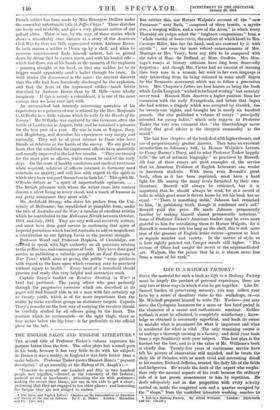THE ENGLISH SALON AND ENGLISH LITERATURE.* THE second title of
Professor Tinker's volume expresses his purpose better than the first. The salon plays but a small part in his book, because it has very little to do with his subject. In France it was a reality, in England it was little better than a make-believe. Professor Tinker quotes Hannah More's "piquant description " of an assembly at the Bishop of St. Asaph's :-
" Conceive to yourself one hundred and fifty or two hundred people met together,—dressed in the extremity of the fashion ; painted as red as bacchanals ; poisoning the air with perfumes ; making the crowd they blame, not one in ten able to get a chair ; protesting that they are engaged to ten other places ; and lamenting the fatigue they are not obliged to endure."
• The Salon and English Letters: Chapters on the Interrelations of Literature and Society in the Age of Johnson. By C. B. Tinker. London: Macmillan and Co. (10s. net.] But neither this, nor Horace Walpole's account of the " new Parnassus " near Bath, " composed of three laurels, a myrtle tree, a weeping willow, and a view of the Avon," in which every Thursday six judges select the " brightest compositions " from a " whole vaseful of bouts-rimes, the authors of which kneel to Mrs. Cassiope Miller, kiss her fat hand, and are crowned by it with myrtle " ; nor even the more refined entertainments of Mrs. Montagu or Mrs. Vesey, have any title to be compared with the salon of Mme. du Deffand or Mine. Geoffrin. Mrs. Mon- tagu's essays at literary criticism have long been deservedly forgotten ; and though Mrs. Carter had an amount of learning then very rare in a woman, her work in her own language is only interesting from its being coloured in some small degree by the Romantic movement which was to follow a generation later. Mrs. Chapone's Letters are best known as being the book which Lydia Languish "wished to be found reading" but certainly never read. Hannah More deserves a higher position from her connexion with the early Evangelicals, and before that began she had written a tragedy which was accepted by Garrick, ran for twenty-one nights, and brought her in nearly six hundred pounds. She also published a volume of essays " principally intended for young ladies," which only suggest to Professor Tinker the very true comment that " the bluestockings never realize that good advice is the cheapest commodity in the world."
The last four chapters of the book deal with higher themes, and are of proportionately greater interest. They form an excellent introduction to Johnson's talk, to Horace Walpole's Letters, to Fanny Burney's Diary, and to what Professor Tinker happily calls " the art of intimate biography " as practised by Boswell. All four of these essays are good examples of the service that an American Professor of English Literature can render to American students. With them even Boswell's great book, often as it has been reprinted, must have a hard fight for life among the many rivals furnished by their own literature. Boswell will always be criticized, but it is important that he should always be read, for as a record of talks in which good sense is driven home by wit his book has no equal. " There is something noble,' Johnson had remarked to him, ' in publishing truth, though it condemns one's self.' Boswell paid this price. He made Johnson permanently familiar by making himself almost permanently notorious." Some of Professor Tinker's American readers may be even more grateful to him for introducing them to Horace Walpole, for if Boswell is sometimes left too long on the shelf, this is still more true of the greatest of English letter-writers—greatest at least as regards number and variety. In the matter of style, as is here rightly pointed out, Cowper stands still higher. " The recluse of Olney had caught the secret of the unpremeditated art. Walpole, like the prince that he is, is almost never free from a sense of his rank."


















































 Previous page
Previous page